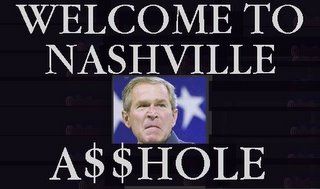A lot of keystrokes have been pecked describing Bushco's approval of a deal selling terminal operations in major East Coast ports to
Dubai Ports World (DPW), a corporation owned by the government of Dubai in the United Arab Emirates. Most of the commentary that I've read revolves around issues of port security and terrorism, with critics highlighting the Bush administration's malignant neglect of our nation's shipping infrastructure. Others have maintained that while this is certainly a bad political move, this particular sale isn't necessarily a security risk, as the global shipping business and port operations are by their very nature transnational and the previous terminal owners, P&O, where themselves a foreign-owned (UK) business.
A few people raised concerns about the loss of jobs as a result of the sale. I initially posted
this snarky response to one such commenter:
I'll leave alone the irony of talking about moving port jobs off-shore ;)
There is a threat to our national security due to the privatized and globalized ownership of our ports, but it isn't posed by terrorists. It's a threat to the
economic security of the American workers who form the backbone of our national transportation and shipping infrastructure, according to
this piece by Richard Vogel in the February 2006
Monthly Review:
Currently, intermodal transportation of cheap imported commodities is the lifeline of the American economy. In 2004, the Port of Los Angeles processed 7.3 million container units and Long Beach handled 5.8 million. These two ports alone accounted for 68 percent of the West Coast total and are, by far, the largest employers in California. U.S. workers, who have seen so many lucrative manufacturing jobs moved overseas, assumed that import transportation and distribution jobs could not be offshored and were, therefore, relatively secure.
Current transportation trends are proving labor’s assumption to be dead wrong.
A note on this article's source: It is fair to note that the editor of the Monthly Review, and many of its commentators, are dyed-in-the-wool Marxists who are as committed to the political agenda of Marxism as they are to its (marginally) more accepted academic incarnations. The journal sometimes veers into some rather silly apologetics for Marxists regimes, but taken on the whole, it attracts high quality leftist scholarship and is well regarded in leftist academic circles, especially in Europe. It's editors have included some of the luminaries of American leftist scholarship, including Harvard economist Paul Sweezy and University of Illinois media scholar Robert McChesney. Just FYI, for those of you who obsess over the credibility of sources...Sparked by organized resistance and wildcat actions by workers against falling wages and deteriorating working conditions at America’s ports and on the nation’s highways, the flow of container traffic is being shifted to a south-north orientation. By leveraging both the U.S. and Mexican governments and taking advantage of the terms of the North American Free Trade Agreement (NAFTA), big capital is developing container terminals in Mexico and using that country as a land bridge and labor pool to deliver shipping containers to destinations in the United States at discount prices.
Vogel describes a fundamental restructuring of how goods are transported in this country, following a pattern that is disturbingly familiar: well-paid American union workers, in this case longshore workers (affiliated with the
ILWU) and Teamster drivers, are finding their jobs outsourced to foreign workers who will work for a fraction of the price. This restructuring is being accomplished via the construction of what Vogel calls “NAFTA Corridors,” a system of port terminals, highways, and rail lines that are being built from the Pacific Coast of Mexico and stretching through the heartland of the United States all the way to the Canadian border. The costs of this mammoth infrastructure construction project, the biggest in U.S. history, are staggering: a landmass the size of the state of Vermont will be necessary to accommodate the transportation corridors; the increase in vehicular traffic is expected to dramatically increase pollution; and the highway system, to be operated as toll-roads, has already been privatized under exclusive development agreements with the states in which they are being developed.
The cost of these NAFTA corridors is estimated at $31.4 million
per mile. On the surface, it seems like a boon to the American construction industry. However,
Building and operating the NAFTA corridor system will require an army of labor, and capital is looking for the cheapest labor it can find to maximize profits. To meet their manpower needs, the developers and operators of the NAFTA system are planning to exploit Mexican labor on an unprecedented scale. Chronic structural unemployment in Mexico and political vulnerability in the United States have rendered Mexican workers prime candidates for exploitation, and they are already being widely tapped for highway construction projects.
This is just the tip of the proverbial iceberg, in terms of the number of transportation jobs that will be affected:
Though the exploitation of immigrants, both legal and illegal, to build the NAFTA corridor system will be heretofore unparalleled, the offshoring of U.S. transportation jobs will have a substantially larger and longer lasting impact on labor on both sides of the border.
The list of transportation jobs that will be offshored to Mexico is long: port employees from supervisors and inspectors to crane operators and longshoremen; railroad construction and maintenance workers and supervisors; railroad operators; warehouse workers and supervisors; highway construction and maintenance workers; local and long haul truck drivers; and an army of logistical support workers for the entire network.
Vogel spends the remainder of the article discussing how this situation arose out of the implementation of NAFTA and other neo-liberal “free trade” regimes, as well as touching on some of the innovative cross-national labor partnerships that have sprung up to resist this race-to-the-bottom in the transportation industry.
Now, what does this all mean politically? I believe that the current brouhaha over DPW's ownership of shipping terminals may provide Democrats an opportunity to extensively broaden their critique of the Bush Administrations incompetent “attempts” to safeguard our nation's transportation infrastructure, both in the short and long-term. Consider:
- Foreign-owned corporations (either private or state-owned) control our shipping terminals, potentially compromising our physical safety by providing a soft spot for terrorists to exploit. Now, let me say that as of right now, I haven't read or seen anything that would lead me to believe that DPW is a threat to our national security, and I think that this point plays to our nation's ugliest xenophobic and racist tendencies. That said, it has become an explosive political issue.
- Shipping corporations are willing to move cargo terminals outside of the United States in order to take advantage of the lowered costs of business and NAFTA rules which allow for the free flow of goods across national borders. Likewise, jobs in other transportation industries will be opened to competition from foreign laborers willing to work for substantially cheaper wages. Too many Americans are already familiar with the downward spiral that occurred in other sectors of the economy due to “free trade” rules. The privatized nature of our transportation infrastructure, in other words, will cost us jobs
- Right now, the roughly 2000 mile diversion from East Asia to the Western United States, via Mexico, saves transportation consumers about 15% over shipping directly to ports on the West Coast of the United States. Let's assume that ports on the West Coast atrophy as a result of this transportation restructuring and that the new Mexican ports become the primary points through which Asian goods will flow into North America. Now let's remember: the entire global trade system is dependent upon cheap energy. I think it's safe to assume that the 15% savings accrued because of cheap land and labor may soon be offset by rising oil prices. If there is no recourse to more energy efficient trade routes (a big IF, to be sure), consumers take a hit in the wallet.
In other words, the DPW opens a nasty can of worms for Bushco. The deal not only offers an opportunity to show the Bush Administration is cavalier with regard to our physical security, but its also provides a chance to demonstrate that their slavish adherence to “global free trade” is damaging the economic security of our nation. Moreover, as Vogel points out, Democrats may find a willing partner in the efforts in organized labor, which has already been working with their counterparts in Mexico to deal with other multinational corporations that have used NAFTA to pit workers against each other.
Who owns our ports does not only matter in terms of stopping future terror attacks. Their ownership may affect the ability of hundreds of thousands of Americans to be economically secure.


